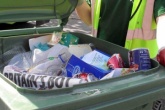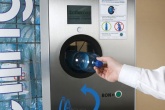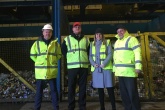No increase in recycling rates without funding reform, says LARAC
Direct charging for household waste collections and reform of the Packaging Recovery Note (PRN) system are among the key recommendations for resolving the local authority funding crisis and increasing recycling rates, according to a new policy paper from LARAC (the Local Authority Recycling Advisory Committee).
Local authorities currently bear the brunt of the financial burden of waste collections, with many buckling under the strain caused by stretching meagre resources as far as they can go in an age of government austerity measures. The new policy paper released today (11 April), ‘The future of local authority waste funding’, seeks to explore the options for bringing about a more equitable sharing of the costs of recycling and waste collection between councils, producers and householders, as well as to stimulate a debate to facilitate changes in council waste funding.
Since the late 2000s, government austerity measures have had a suffocating effect on local authorities, one which appears to have little prospect of being alleviated - between 2015 and 2020 the Revenue Support Grant to English local authorities will have been cut by 75 per cent.

At the same time, UK recycling rates have stalled; after increasing from 12 to 40 per cent between 2001 and 2010, the UK’s recycling rate has only risen by 5.2 per cent to 45.2 per cent in 2016/17. Performance varies across the devolved administrations, with Wales independently reporting a 63.8 per cent recycling rate in 2016/17 and Scotland achieving 45.2 per cent, while England is on 44.6 per cent. Wales is the standout performer here, but with significant investment from the Welsh Government and funding from councils.
The problem becomes more acute when considering the fact that UK local authorities are likely to be beholden to the 60 per cent recycling target for 2030 set by the EU’s Circular Economy Package, which the Department for Environment, Food and Rural Affairs (Defra) has indicated the UK will be signing up to.
It can appear as if local authorities are fighting on their own - they have organised collections and invested heavily in services so that most councils collect paper, glass, plastic bottles and cans, but then they are also obligated to collect other more challenging wastes. The briefing paper argues that the push for increased municipal recycling rates is one that must be shared, with producers contributing their fair share through improving the recyclability of their goods and facilitating segregation.
Commenting on the release of the briefing paper, Carole Taylor, Chair of LARAC, said: “The achievement of local authorities in the past ten years to raise recycling rates to current levels have come at great expense to them. Millions of pounds of public money are used each year to build and run these services but after years of austerity the current funding model is no longer fit for purpose.
“We need to decouple the provision of waste services from council tax and move it to something that the supply chain and users are responsible for. This will mean some difficult conversations across industry and consideration of thorny policy areas, but it is time to grasp those particular nettles.”
LARAC’s paper explores a number of new funding opportunities, including economic incentives, direct regulation, information-based instruments and consistency.
Economic incentives
Given LARAC’s assertion that local authorities’ reliance on the revenue support system is not sustainable, it feels that councils should be given the option to introduce alternative approaches to fund municipal waste collection.
One such incentive the briefing paper explores is direct charging for waste collection. The idea is that the introduction of direct charging schemes places the real cost of waste management on the waste producer, which is far greater than the portion of council tax that actually gets spent on collecting waste, to incentivise them to increase recycling and reuse and reduce waste generation.

Such schemes are widely used in Europe and generally funded by flat rate fees or taxes, with a variable pricing element in accordance with choice of container size, the number of sacks set out for collection, collection frequency or weight of material put out for collection, with the paper citing studies that name weight-based approaches as the most successful. The paper acknowledges the contentious nature of any introduction of a discretionary charging scheme in the UK and backs a ‘robust and comprehensive’ research programme to investigate whether it would work in the UK.
The paper also explores the impact on local authorities of a deposit return scheme (DRS) for drinks containers, whereby containers are returned to a collection point in return for a pre-paid deposit, in the aftermath of the recent announcement by Environment Secretary Michael Gove that a DRS would be introduced in England before the end of the year.
While acknowledging the potential of a DRS to increase recycling rates, the policy paper expresses concern at the fact that the materials targeted by a DRS - plastic, glass and metals - are already collected at the kerbside, at significant cost to local authorities, and removing these higher quality materials from this stream would have a negative financial impact on local authorities, a position previously laid out by LARAC.
To avoid this potential situation, LARAC states that it: ‘supports the concept of Extended Producer Responsibility that DRS would bring to the UK, providing it does not negatively impact on local authority budgets. Materials which are not universally collected at the kerbside are harder to recycle and should be considered as a priority for inclusion.’ These ‘on the go’ items include coffee cups, cartons and smaller drinks containers, while LARAC supports a full impact analysis to establish the potential impacts on local authorities of a DRS.
Of more contentious stock is LARAC’s exploration of fiscal funding options, including an incineration tax, akin to that applied to landfill, in order to divert material away from incinerators and keep them in economic use for as long as possible. However, LARAC’s policy paper does not advocate an incineration tax, pointing to higher costs for local authorities and the unintended consequence that it may divert material away from recycling to the cheapest mode of disposal, or exported out of the UK economy. The paper suggest this measure would only work in a closed market situation.
Also explored are taxes on virgin materials or hard-to-recycle products, such as mattresses or coffee cups, and advance disposal fees, although in the first instance sufficient recycling facilities would need to be in place to deal with the extra material collected, while in the second, paying disposal fees at the point of sale may not accurately reflect collection and recycling costs where there is a long time lag between purchase and disposal.
The final economic incentive explored is direct funding through reward schemes. Government has usually prefered to incentivise people to encourage them to recycle more as opposed to threatening to penalise them in the event of non-compliance. The paper gives the example of Defra’s Reward and Recognition Fund, which ran from 2001-2014 and gave around £2 million to local authorities to deliver schemes to encourage recycling. However, these schemes were found to be expensive to run and resulted in little increase in recycling tonnage.
Direct regulation
Another method of cost recovery explored by the LARAC policy paper is direct regulation, compelling local authorities or producers to recycle materials and take responsibility for their share of the costs of recycling.
The paper looks at statutory targets, such as those implemented in Wales, which have had success when accompanied by government funding - Welsh Environment Minister Hannah Blythyn recently approved £7.5 million of funding to help boost councils boost recycling rates - although additional funding from local authorities is often required. LARAC feels that the introduction of statutory targets for recycling could divert funding away from other vital council services, while also shifting responsibility away from the producer, and that some councils with high population densities may struggle to meet targets without significant additional investment.
Producer compliance schemes are also given attention, with the paper recognising that they have the potential to reduce the burden on local authorities, although with most schemes seeing producers paying in to the scheme rather than taking direct responsibility, this often dilutes incentives for producers to design products for recyclability. Scheme fees should be linked to end-of-life treatment costs.
The UK’s packaging compliance scheme, the PRN system draws criticism, particularly that it is worth only £60 million when local authorities spend nearly £600 million a year collecting packaging, not accurately reflecting the cost of dealing with these materials. This means that producers only contribute around ten per cent of the cost burden for these collections.
For such schemes to operate effectively, LARAC’s policy paper underlines the need for a ‘sophisticated interaction between government and industry’ to ensure that the PRN system incentivises the sustainable sourcing of materials and design for recyclability as well as encouraging investment in UK recycling infrastructure through increasing producer responsibility.
Design for recyclability can be encouraged through performance standards, such as minimum recycled content in products, although these should be applied with caution so as not to stifle innovation.
The paper further alludes to the right of local authorities under Section 46 of the Environmental Protection Act 1990 to apply penalties for not recycling, though this has rarely been invoked, with some councils prefering to ‘nudge’ residents to recycle more by reducing collection frequency, which allows councils to limit the increased costs of service provision while maximising recycling performance.
Information-based instruments and consistent collection standards
LARAC recognises that product labeling on packaging can be misleading and confusing, and as such supports the standard use of the On-Pack Recycling Label (OPRL), of which LARAC is an owning partner, to provide clearer recycling information to the public.
Finally, LARAC explores the case for consistent collection standards as have been proposed and implemented in Wales and Scotland and put forward by the Waste and Resources Action Programme (WRAP) in England in the form of three approaches in the ‘Framework for Greater Consistency in Household Recycling for England’. While the Welsh and Scottish Governments provide funding to help councils adapt, WRAP provides assistance in evaluating the business case for adopting a consistent approach, which often results in increased costs.
LARAC has concluded that these changes are not viable without significant additional funding, and that councils should retain flexibility in their approach: ‘A range of factors determine the cost effectiveness of specific collection and disposal arrangements, including waste composition, demographics and the location and availability of reprocessing and disposal facilities’.
Recommendations
LARAC makes a series of recommendations for priority actions areas from high to low priority through to those actions which are not recommended.
High priority actions
- Direct charging
- Producer compliance schemes
- Information-based instruments
Medium priority actions
-
DRS
Low priority actions
- Taxes and levies
- Performance standards
- Consistency
- Compulsory recycling or fines
Actions not recommended
- Incineration tax
- Reward schemes
- Statutory targets
You can read the LARAC policy paper, ‘The future of local authority waste funding’, on the LARAC website.










